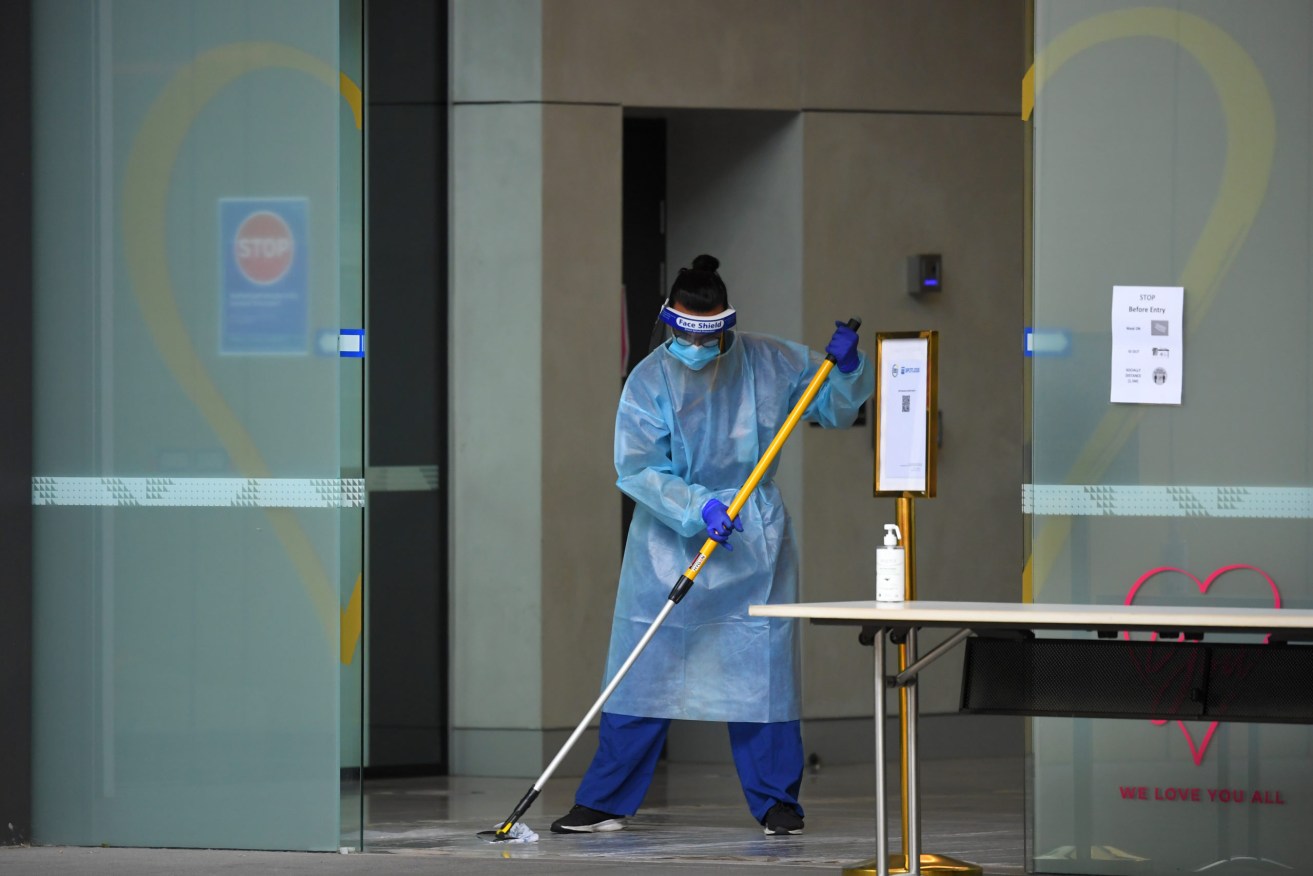Apparently no one made private security decision in Victorian hotel quarantine bungle
No individual made the decision to hire private security guards to oversee returned travellers in Victoria’s hotel quarantine, the final report into the bungled program has found, as relatives of some aged victims consider a class action against the state government.

Photo: AAP/James Ross
Victoria’s second wave of coronavirus, which resulted in more than 18,000 new infections and 800 deaths, can be traced back to security guards working at the Rydges on Swanston and Stamford Plaza hotels.
In the inquiry’s final report, tabled in parliament on Monday, retired judge Jennifer Coate concludes the evidence heard at the inquiry “did not identify that “any one person decided to engage private security in the program”.
She said the decision to hire the guards was not made at a ministerial level, effectively clearing Premier Daniel Andrews, former health minister Jenny Mikakos and senior government ministers Martin Pakula and Lisa Neville.
“Enforcement of quarantine was a crucial element of the program that the premier had committed Victoria to adopting, but neither he nor his ministers had any active role in, or oversight of, the decision about how that enforcement would be achieved,” the report reads.
However, the report also found there was no consideration as to whether security guards were the right cohort to guard the hotels, rather than police or Australian Defence Force personnel.
“Not one of the more than 70,000 documents produced to the inquiry demonstrated a contemporaneous rationale for the decision to use private security as the first tier of enforcement, or an approval of that rationale in the upper levels of government,” it found.
The role performed by security guards in the program was “ill-defined from the beginning and was, ultimately, a role not suited, without close monitoring and extensive and continued training, to the cohort of guards that was engaged”.
Coate said the security guards were a “largely casualised workforce in an environment where staff had a high likelihood of being exposed to the highly infectious COVID-19”.
“This, of course, had flow-on impacts in terms of the spread of the virus,” she wrote.
Mikakos and two senior public servants have already resigned over the hotel quarantine scandal.
But the Victorian government could face a class action.
Suzanne Agnello’s 92-year-old mother-in-law died in the Epping Gardens aged care home during Victoria’s second wave of coronavirus, which was linked back to failures in the hotel quarantine system.
Her family is pursuing a class action against the facility and revealed plans to discuss further legal options after the release of Monday’s final report.
Ms Agnello said she was disgusted by the findings and has called for a royal commission into the bungle and told the decision maker to “man up and tell the truth”.
“Somebody must have known who wrote the cheque, somebody must have known who gave the permission to bring in the security people,” she told Melbourne’s 3AW radio.
She said a class action “had to happen” and said they would be speaking to their lawyers on Monday.
“You can’t run a state and not know who’s responsible,” she said.
Andrews today apologised for the “very clear errors” in handling the quarantine program and signalled an intention to implement all of Judge Coate’s recommendations.
It was less an issue about who worked in the program, and more a lack of detailed oversight and daily checks of what was occurring in hotel quarantine, he said.
The significant breach and resulting transmission ended in a wave that couldn’t be pulled up without significant restrictions including on family gatherings and workplaces.
“For that I am sorry, we are sorry,” he said.
“My commitment … is to learn those lessons and to make sure that an error like this – that lack of oversight, that lack of due diligence to check and double check – that those things, if a problem is found, it is found early rather than being found too late.”
-with AAP




